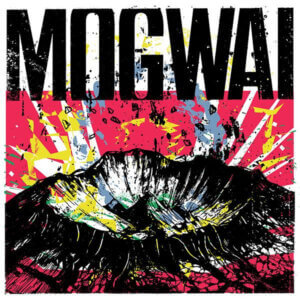
7.0
Ultra Mono
IDLES
Bristol quintet IDLES’ crushing third album, Ultra Mono, follows up singer Joe Talbot’s reckoning with grief over losing his mother on 2017’s Brutalism and losing his daughter during childbirth on 2018’s Joy as an Act of Resistence. “Emotionally, I’m not healed. I’m healing, and that’s what’s on [Ultra Mono]. So this one is about processing and finding pragmatic ways of moving forward, and from your reaction to that trauma, you build something concise and beautiful.” More broadly, he says, Ultra Mono is about self-acceptance and trying to be the best version of yourself.
Musically, Ultra Mono is as tight, ballistic, and in your face as IDLES have ever been. That owes greatly to the touch of hip hop producer Kenny Beats. Lyrically, Ultra Mono is louder – and prouder – than the band have ever been. Along with being open about extremely personal matters, IDLES have always been outspoken in their music about social and political issues. In fact, the band have drawn frequent criticisms for sloganeering, hurling cheesy clichés that verge on virtue signaling, and lacking poetic nuance.
On Ultra Mono, IDLES double down on their bluntness. They beat their political polemics into your head. They believe in what they say, and they make a point of saying it as clearly as possible, because they feel they’ve been misinterpreted for as long as they’ve existed. “Go ahead. Tell ’em what I’ve intended,” Joe scoffs on “Grounds,” one of the album’s many responses to the band’s critics.
Otherwise, although Joe says the album is about the process of healing, Ultra Mono also finds him focused on the current state of the world. They continue hammering away at racism, classism, toxic masculinity, and white privilege. Pummeling Ultra Mono track “Anxiety” tosses big pharma into that list. IDLES also take clear-eyed aim at blind, Brexit-fuelled patriotism on the electrifying “Model Village.” On the charged “Carcinogenic,” they condemn housing problems, misuse of public spending, the military-industrial complex, the destruction of the environment, and the grind of capitalism.
Such screeds dominate Ultra Mono, but there’s plenty of beauty in the album’s positive, motivational spirit. “You only die once. You’ll never come back. You’re gone when you’re gone,” he grimly points out on “Carcinogenic,” before advising, “So love what you can.” IDLES also kick the album’s clichés into overdrive in flagrant defiance of the band’s critics. “Let’s seize the day, all hold hands, chase the pricks away. You can do it! You can do it! Yes, you can! Woohoo!” the chorus of the obliterator “Mr. Motivator” goes. “How do you like them clichés?” he asks, although the question follows verses of absurd images like “Conor McGregor with a samurai sword on rollerblades” and “Kathleen Hanna with bear claws grabbing Trump by the pussy.”
Either way, “Mr. Motivator” is meant to empower both the listener and the band. It’s just one of several songs on Ultra Mono that calls for togetherness, inclusivity, and equality. “Ne Touche Pas Moi” is both a call for these things and an example of accepting and baring imperfection. As the song’s collaborator, Jehnny Beth of Savages, pointed out to Joe, “Ne touche pas moi” is not how you say “Don’t touch me” in French. But she decided to sing the incorrect phrase because it was more honest. Over the song’s buzzing fury, Joe warns: “This is a sign-off for the catcallers…. Your body is your body, and it belongs to nobody but you.” Beth barges in with “Ne touche pas moi” between Joe alternating the proclamations, “This is my dance space” and “This is your dance space.” Afterwards, the two powerful singers join together in a chorus calling for ”Consent! Consent! Consent!”
IDLES preach vulnerability, kindness, and love, but although he opens himself up, Joe doesn’t take criticism well; he even admits he can’t let go of grudges, that they make him more powerful. Thus, it sticks out all the more how hard he goes on the offensive. The first time we hear his voice on Ultra Mono, he’s doing onomatopoeia of a sword going “wa-ching!” as it’s going in,
followed by the “clang”s “of a gun going bang-bang” on “War.” Faced with the cold, industrial doomsday battle march of “Reigns,” you can picture the blue blooded aristocracy falling before the working class masses, especially as a strangled saxophone bleeds in at the end. On the quaking battlecry “Grounds,” on which Joe sings, “Fee, fie, fo, fum,” he plays the role of Jack standing up to the unfriendly giant in the clouds.
In these examples, they go on the offensive for the sake of a greater societal good. On “The Lover,” though, Joe is once again hung up on his critics, a much more frivolous grudge. “You say you don’t like my clichés,” he sings before rubbing it in with a hell of a cliché – and middle finger: “I say love is like a freeway. Fuck you. I’m a lover.”
There are few signs of Joe’s personal grief, but after listening to the album, I’m still left wondering how he defines pragmatic solutions towards personal healing. The foundation of Joe Talbot’s efforts towards self-improvement and healing is expressing unabashed love, and he says plenty to lift up those around him. But the band should focus on hurling stones at the structures and agents of true injustice and inequality rather than waste energy squabbling with critics, the least of their worries.
Latest Reviews
Tracks
Related Albums
Related News
Advertisement
Looking for something new to listen to?
Sign up to our all-new newsletter for top-notch reviews, news, videos and playlists.














